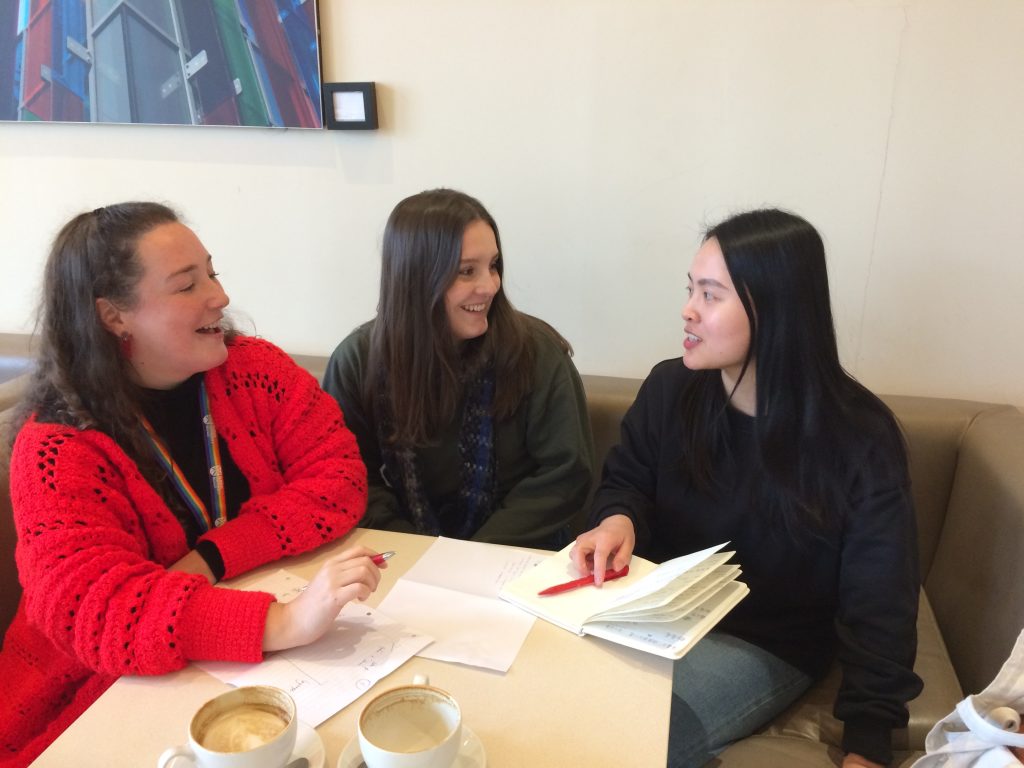This post is part of our Research Initiation Scheme for 2022-2023.
On 24 March 2023, the Queen’s University Belfast Modern Languages Core Disciplinary Research Group hosted the Postgraduate Research in Progress session as part of their ongoing seminar series. The seminar was chaired by PhD candidate Ciara Gorman, with fellow PhD researchers Sijie Mou (Linguistics), Rebecca Gosling (French), and Laura Kennedy (French) presenting their work. The main theme of the seminar was addressing the challenges that arise when trying to complete a piece of work as substantial as a doctoral thesis.

The first speaker from the panel was Sijie Mou, who explained her work so far on rhotacization in the Beijing dialect. The use of this linguistic feature varies by district and can often be a signifier of social status. For example, Sijie pointed out that highly educated females are less likely to use rhotacization in their speech.
The challenge that Sijie currently faces is the struggle to build an accurate corpus of natural speech for analysis. Having previously studied linguistics in China, Sijie felt that the preferred technique of Chinese researchers, relying on a strict word list, was not useful to her. Instead, she wants to interview native speakers to gather data. This presents some unique issues such as the observer’s paradox – the idea that if someone knows they are being observed, they will not speak naturally. Therefore, Sijie is considering how she can make her interviewees as comfortable as possible, for example by avoiding sensitive topics like politics and conducting interviews in a relaxed atmosphere.
Secondly, we heard from Rebecca Gosling, a second year PhD candidate with a fine art and art history background, who is currently studying the mirror in the toilette through nineteenth-century artwork. In this time period in France, the toilette was an intimate, female space wherein women would dress themselves and get ready for the day. In particular, the toilette underwent a significant shift in the late nineteenth century from being a public to a much more private space.
However, because there is such a large and varied volume of toilette art, Rebecca has faced difficulty effectively categorising her corpus. She has narrowed her focus to the period 1870-1890, but even then, a substantial volume of artwork remains. She is specifically focused on the mirror as a material object and has therefore considered a variety of means of categorisation, for example sorting by theme (i.e. what is happening in the artwork?), era (i.e. the date of the artwork’s completion), and type of mirror (i.e. is it a handheld mirror, mounted on a wall, or free-standing?).
Finally, Laura Kennedy introduced her work. Her thesis is examining politics and poetics in francophone and anglophone works that deal with postcolonial themes. The problem Laura faces is that almost all the authors she is writing about are still alive and actively publishing work. This has led to some exciting opportunities. For example, Laura was herself able to interview Patrick Chamoiseau, an author whose work she is studying.
On the other hand, though, the authors under study in her thesis are constantly tweeting, publishing articles and essays, giving interviews, reacting to researchers’ opinions, and in one case, even being arrested. Laura has therefore struggled to find the right balance between keeping her work up to date and focusing on the analysis of her chosen works in order to finish her thesis. After all, it can be difficult to respect the theory of the death of the author when in reality they are easily reachable via social media.
The seminar concluded with a question-and-answer session that allowed the panellists to elaborate on the evolution of their projects and receive advice from the audience. Overall the panel was extremely insightful and gave me plenty of food for thought as I plan my own postgraduate studies.
Report by Emily Monroe, final-year undergraduate in French
Editor’s note: Laura Kennedy’s interview with Patrick Chamoiseau was published in The French Review in May 2023. See here.